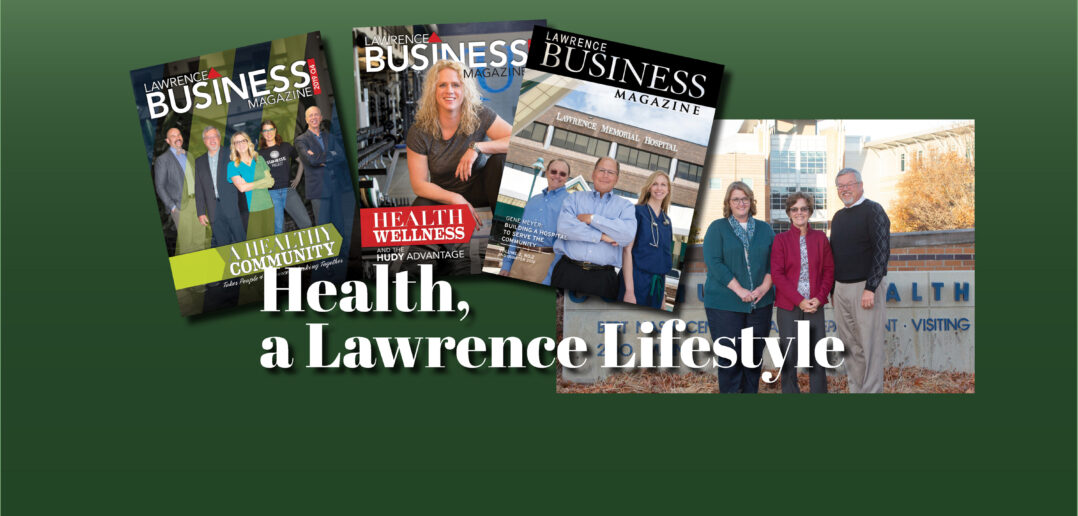HEAD: Health a Lawrence Lifestyle
By Tara Trenary, photos by Steven Hertzog
| story by | |
| photos by | Steven Hertzog |
| OPEN A PDF OF THE ARTICLE |
Americans today are much more focused on their overall physical and mental health than they were a decade ago.
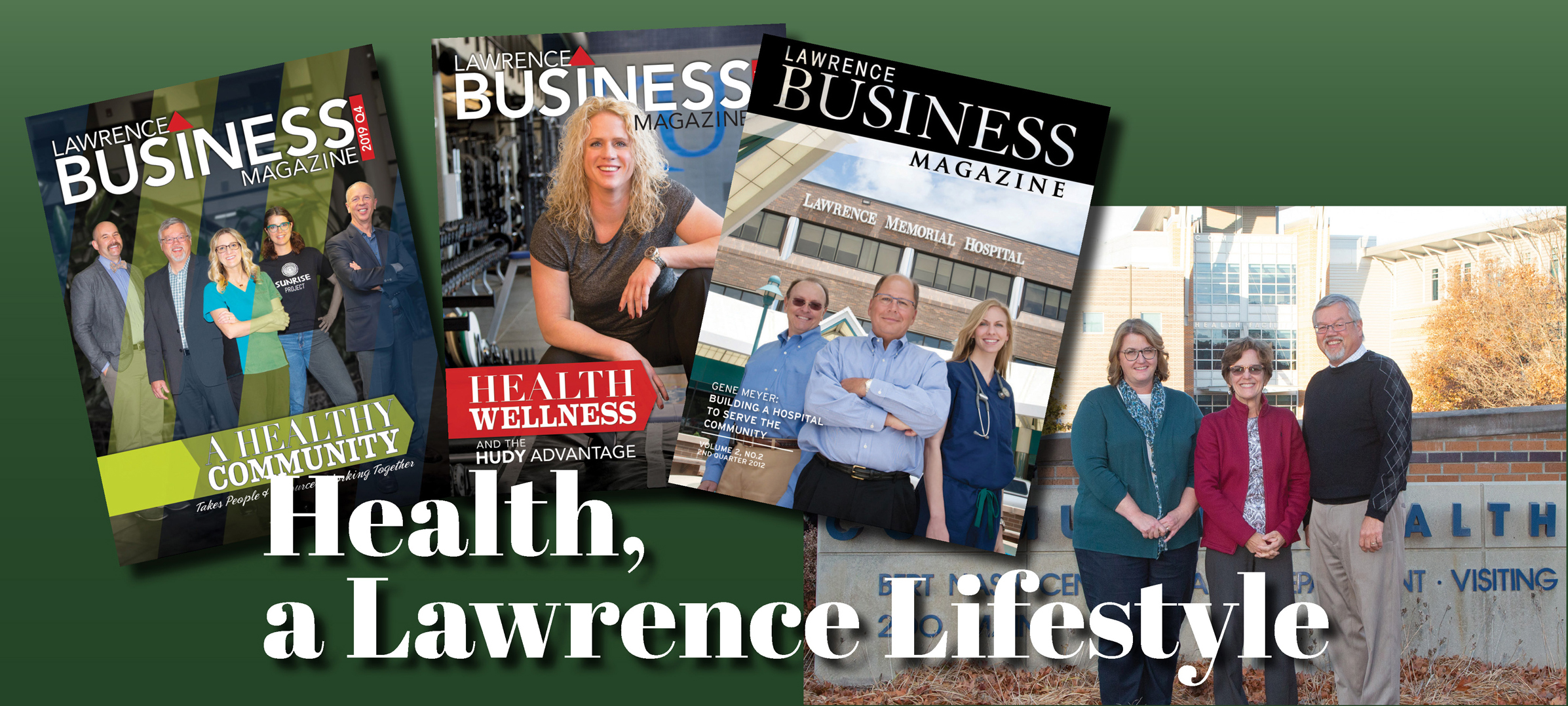
LBM Covers, A Healthy Community 2019Q4, Health Wellness (Andrea Hudy) 2015Q1 and Lawrence Memorial Hospital 2012 Q2;
l-r Vickie Collie-Akers. Beth Llewellyn and Dan Partridge of the County Health Department (2019Q4),
During the last 10 years, health and wellness have become mainstream topics. More and more Americans have begun to rely on this industry to help them keep chronic diseases and declining mental and physical health at bay. Cleaner ingredients, healthier food, more efficient ways to stay fit and a focus on mental health are all expectations that have moved front and center in the last decade.
According to the Forbes article “The 10 Best Wellness Trends of the 2010s,” contributor Bruce Y. Lee explains that along with some “bogus and bad” trends in the past 10 years, there were also many good ones. Some of those include athleisure and eco-friendly apparel; wearable fitness devices; flexible work hours; more plant-based diets; meditation and mindfulness; personalized health and nutrition; and an awakening to mental health.
Now more than ever, especially in the grips of COVID-19, many Americans crave a healthy and active lifestyle. “COVID has put public health in the spotlight like no other event during my career,” says Dan Partridge, director of the Lawrence-Douglas County Public Health Department. “It has shown the strengths and weaknesses of our system, and hopefully will be the catalyst for a stronger, smarter investment in public health.”
So what are the best ways to achieve the goal of optimum wellness many of us long for during this unprecedented time? Let’s take a dive into some of the most significant changes in health, wellness and fitness in the past decade.
Public Health
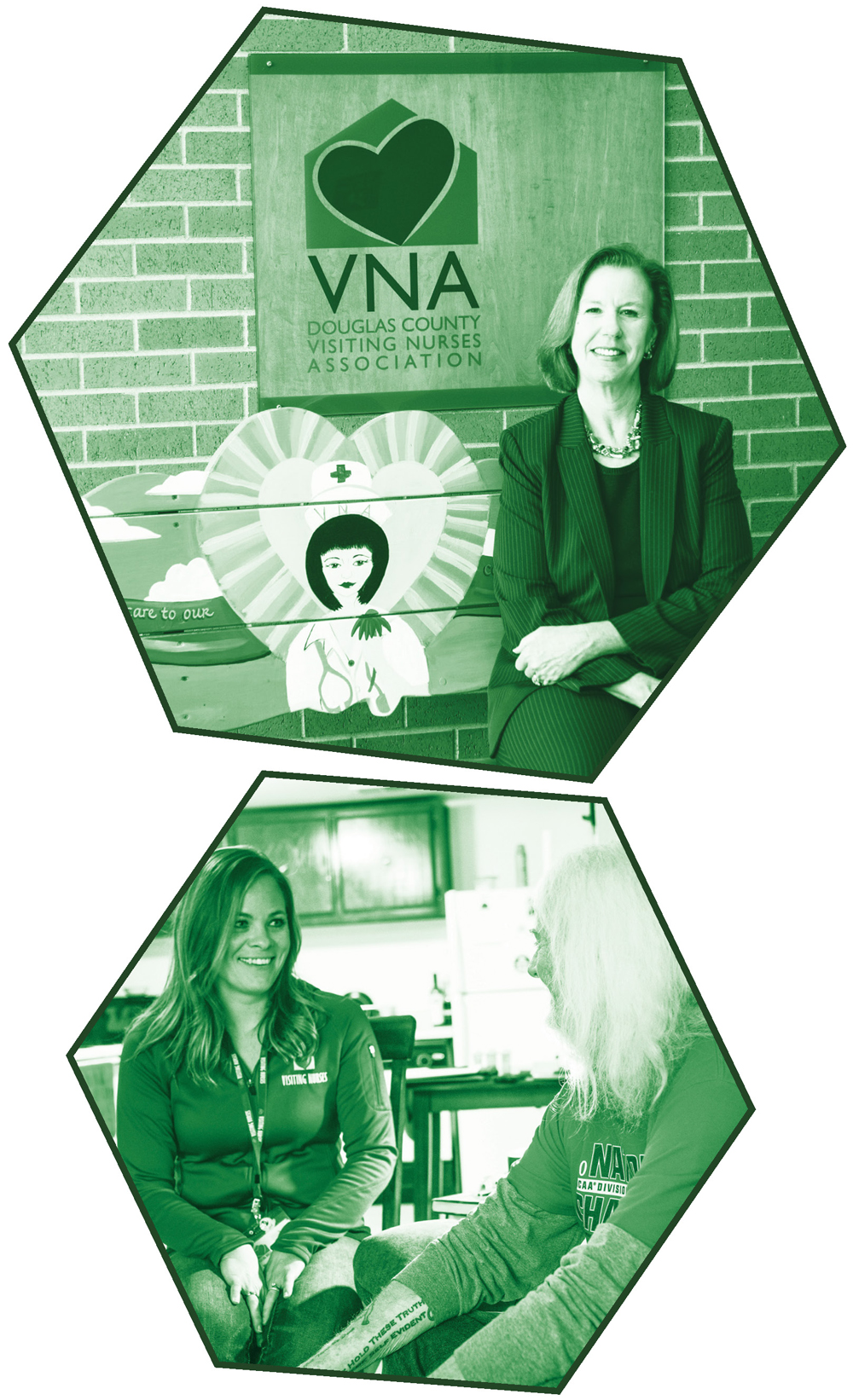
Cynthia Lewis, CEO of Visiting Nurses Association and a VNA social worker Mickey Dick visits with patient Russ Best (2018Q4)
“There is no vaccine we can give the public to prevent diabetes, heart disease, obesity, stress, hunger, poverty, substance abuse and all the other factors that drive our health,” Partridge explains. For public health in the United States to remain relevant (able to prevent chronic disease), long-term foundational federal funding to local public health departments is necessary to bring in the skills and personnel to change policies, systems and environments. “Our clinic has seen a consistent decline in the total number of clients over the past 10 years,” he adds. “But the complexity and severity of the problems they are experiencing has increased.” With this federal funding in place, “people of every skin color and life situation have the opportunity for wellness.”
Cynthia Lewis, CEO, Douglas County Visiting Nurses Association (VNA), a not-for-profit organization that cares for anyone regardless of their ability to pay, is seeing an increasing number of younger patients (40s, 50s, 60s) in its hospice program. “Despite medical advances,” she says, “there comes a point in chronic illness or disease progression that curative treatment is no longer feasible.
“Staffing is a huge issue for us just as it is across health care,” she says, especially with the increases in patients needing VNA services. “Finding creative ways to recruit and retain exceptional people is at the top of my list now and likely for many years to come.”
Improving public health is top of mind for both Partridge and Lewis, and this work starts with equity. “By working to reduce the wellness gap across the racial and economic continuum,” Partridge explains, “we believe we improve the public’s health. We want our workforce to not just be diverse but be committed to health equity.”
VNA’s commitment also extends to all people regardless of race, religion, gender, sexual orientation, etc. “A culture of inclusion and equity has been and always will be essential to meeting our mission,” Lewis says.
Partridge agrees. “Our work starts with a focus on equity and the differential health outcomes we see within our community,” he says.
Personalized Wellness
Mental health has been front and center as of late, and for good reason. The world today is not what it was a decade ago. The isolation of COVID-19, the increased violence of a divided country, the anxiety of not knowing what tomorrow brings. Brandon Zoeller, owner, American Shaman-Lawrence, has noticed in the past few years an increase in the number of people who are trying or consistently using CBD (cannabidiol). Ranging from 18 into their 80s, more people are searching for relief from a world seemingly in turmoil.
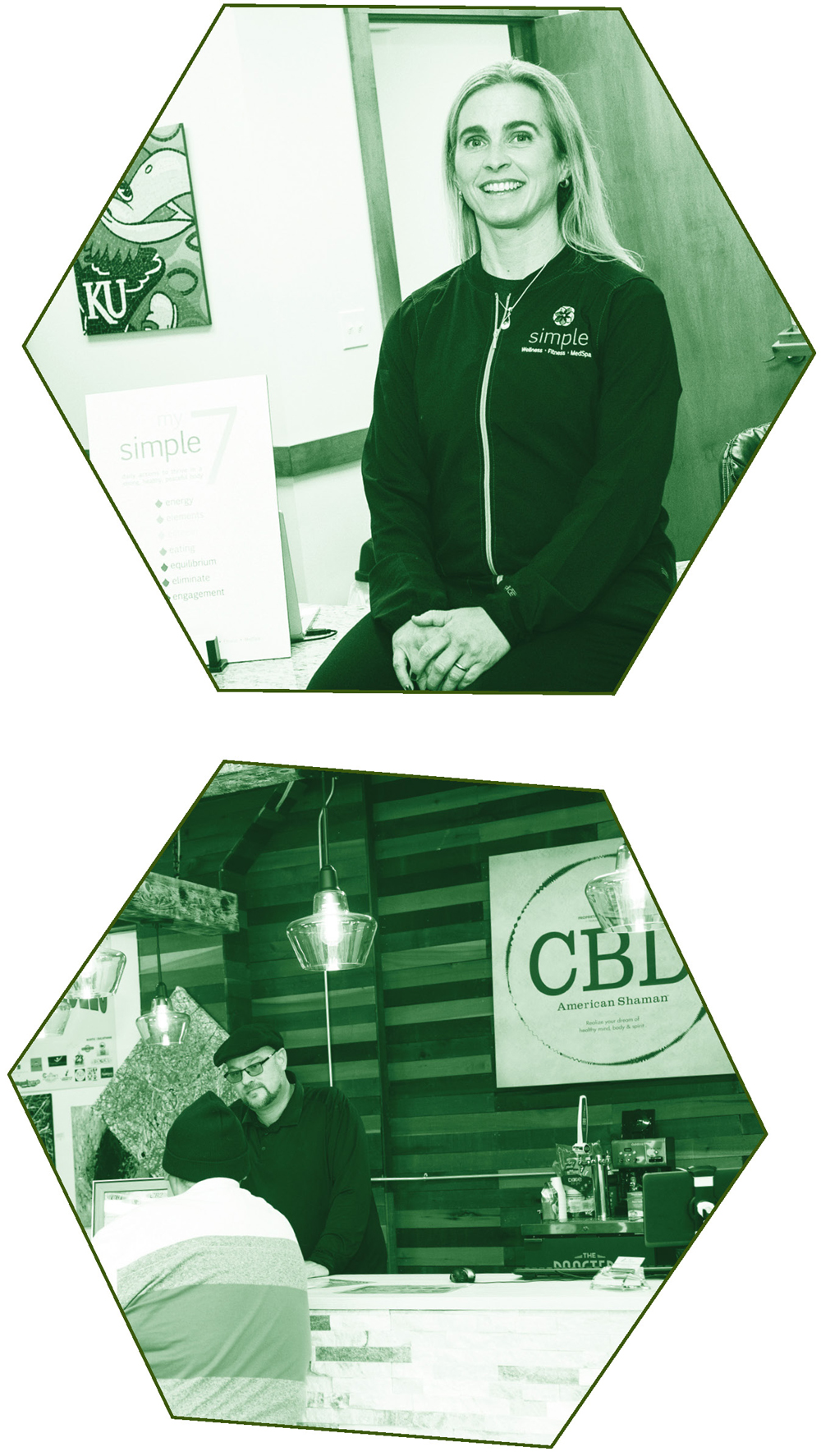
TOP: Dr. Samantha Durland owner Simple Wellness (2019Q4); Brandon Zoeller owner of American Shaman (2019Q4)
“Our company’s goal is to spread health and wellness at an affordable rate, and to give our customers back their quality of life,” he says. “CBD benefits all people, young [and]old. There is no specific person that could potentially benefit from this.”
Zoeller says he is getting more business from people who are seeking something to help them cope. “COVID definitely presented challenges last year, but we made it through, and I think it helped us actually expand our market. More people are willing to try a product that could potentially help with anxiety and stress,” he says. “My job is to spread the word that everyone can potentially have a better quality of life.”
That quality of life is exactly what Dr. Samantha Durland, owner of Simple Wellness, strives to help her patients achieve. Consumers have begun to move away from the standard health and nutrition advice of the past toward personalized health and wellness recommendations from specialists. “We all want the same thing, I believe: peace within ourselves,” Durland, a former OB/GYN, says. “I think that more folks are starting to understand and become engaged in their journey, and many are stepping outside the box and are accepting of it.”
She says the last five years have been an opportunity to see how her vision is valued by her patients as she tries to help people understand that they are so much more powerful than they may think. “Thinking about our body as a whole and understanding and connecting with it is not taught so much in our culture,” Durland explains.
The clinic’s environment is meant to be kind, helpful and transparent in pricing. “I love helping people reconnect with themselves and feel the empowerment of their whole being,” she says. These medical services are for those who want to get better and are engaged in participating in a program of self-improvement.
Simple Wellness offers food and allergy testing, migraine therapy, hormone and weight-loss programs, skin and sexual health services, revive IV (intravenous) therapy and overall women’s and men’s wellness services, among other offerings.
Durland does her best to be aware of what clients value in her practice. It’s important that her patients are able to pursue whatever service or combination of services suits them best. “I look in folks eyes and feel that I just can see whom they are,” she says. “I don’t know what car someone drives, the color of their skin or hair. I just want to help whomever comes feel better in whatever way that I have to help.”
Plant-Based Diets
With California and the entire West Coast of the country leading the way, plant-based diets have definitely grown in the last 10 years. Millions of Americans now seek to incorporate plant-based foods into their diets. Although the number of vegetarians and vegans has not grown significantly, sales of plant-based foods are exploding.
Keri Glassman, MS, RD, CDN, is a renowned celebrity nutritionist, healthy cooking expert and founder and CEO of Nutritious Life. In the Nutritious Life article “The Biggest Wellness Trends of the Past Decade,” she explains: “When fast-food chains start selling the Impossible Burger and Beyond Meat, you know plant-based diets have gone mainstream. With growing environmental and health concerns, lots of people are reducing their intake of animal products as a way to address these issues.”
Nationwide, there are a lot of issues surrounding equity in the food system and access to fresh foods like fruits and vegetables, explains Valerie Taylor, marketing director, The Merc Co+op. “And Lawrence is not without those issues. That access, as well as affordability, can make following a plant-based diet challenging for some folks.”
She says the term “plant-based” in and of itself is a trend. “Rather than label a product by an individual’s diet, like ‘vegan’ or ‘vegetarian,’ labeling something as ‘plant-based’ is more approachable and inclusive of all diets, which can give these foods and products a broader appeal.”
Plant-based foods are much more common than they were 10 years ago, Taylor adds. What was once a diet very much based on whole foods now includes a lot more processed foods and a variety of options across many categories.
“As new plant-based products have developed, there is increased access to products that use almond or coconut, and now oats or nuts like cashew, macadamia or hazelnut,” she continues. “Today, there are so many more options for ‘alt’ milk and cheese, and companies are getting better at approximating flavors.”
Because food and cooking are more a source of entertainment than they have been in the past, people today have access to much more content that can open their minds to cultures, dishes and values to which they may not have been exposed otherwise, Taylor explains. “It makes for exciting opportunities to experiment and try new things, including more plant-based foods. Anyone, regardless of if they adhere to a particular diet, can incorporate more plants into their daily routine.”
A Product Revolution
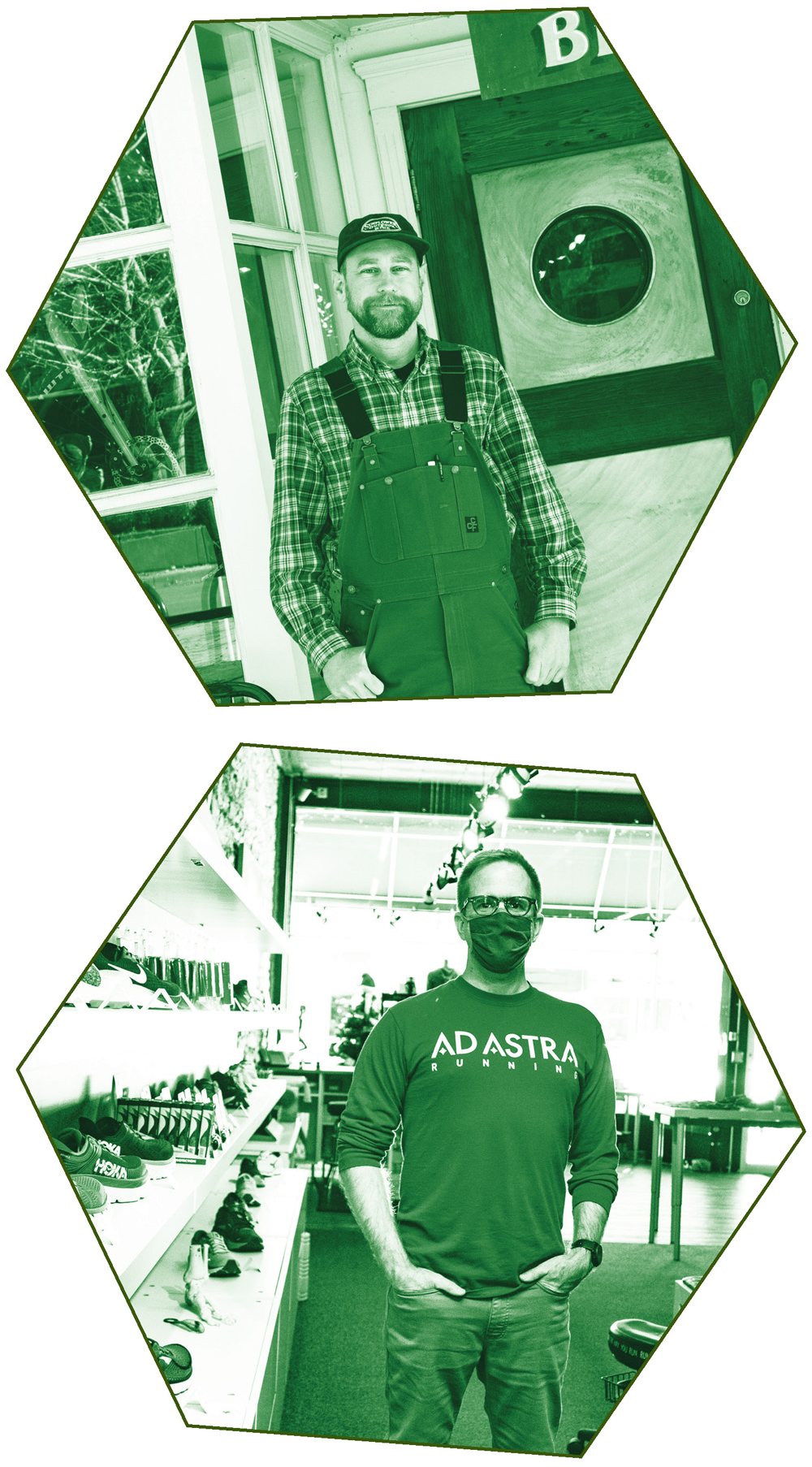
Paul Heimbach, bike shop manager at Sunflower Outdoor and Bike Shop and J Jenkins co-owner of Ad Astra (2020Q4)
When it comes to buying accessories to help maintain a healthy, happy lifestyle, people today are more willing to hand over the cash. Whether it be ecofriendly apparel, devices to help monitor steps, heart rate and calories burned, or equipment like a treadmill or elliptical, a higher price tag doesn’t seem to deter buying these days.
“Customers today appear more willing than they once were to pay a little more for premium products,” says J Jenkins, co-owner of Ad Astra, a specialty running store focused on helping individuals live their happiest, healthiest lives. “Our biggest contribution to sustainability comes from the decisions we make regarding the brands we carry. Many boutique apparel brands we carry are leading the way on sustainable materials.”
Jenkins explains that community is the driving force behind the business. “We live here and want to use our resources to make this a better place for all to live. Profit is important, has to be to remain open, but never the exclusive and preeminent consideration,” he adds.
Much more today than in years before, sustainability has become a key issue.
Paul Heimbach, bike shop manager at Sunflower Outdoor and Bike Shop, says his shop’s mantra is that life is better when outdoors. “We want to provide the best equipment and knowledge to our customers so they can experience the same thing,” he explains. He believes one of the most impactful events from the last 10 years has been the ability to purchase products via the internet. “Companies such as Amazon have made it possible to buy whatever you want at a few mouse clicks away, 24 hours a day.” So to stay relevant, Sunflower has implemented its own website where customers can buy items from the shop.
Jenkins agrees online sales have become an important aspect of shopping, admitting they “have not pursued online sales to a great extent due to the custom nature of the services we provide,” he explains. “But we may need to transition to a hybrid approach in areas where custom fit is less necessary.”
In the last few years, Sunflower employees have learned how to better choose the products people want and then sell it on the website. “This has been a positive way to embrace the changing landscape of retail,” Heimbach adds.
But most important at Sunflower is offering new experiences to its customers and creating an environment that makes them want to be there when not at work or home. “Customers want to have experiences, so that is what we are trying to build upon at Sunflower, a place to come get geared up for your next adventure outdoors. We are looking to provide other experiences for our customers that will hopefully have them coming back for more.”
All in All
Being mentally and physically healthy and happy has become an even more important part of our world in the past decade for so many reasons. But the ways in which we pursue that balance looks very different than it used to. People are less hesitant about spending money on things that will make them look and feel good. They are trying to become their best selves by eating better and taking control of their mental and physical health. They’re seeking advice about how to do that from specialists who have focused their studies on specific aspects of health and wellness.
“Change has to be viewed as a positive,” the Health Department’s Partridge says. “When bad news comes our way, we look for the opportunity it presents to try something new.”
![]()

